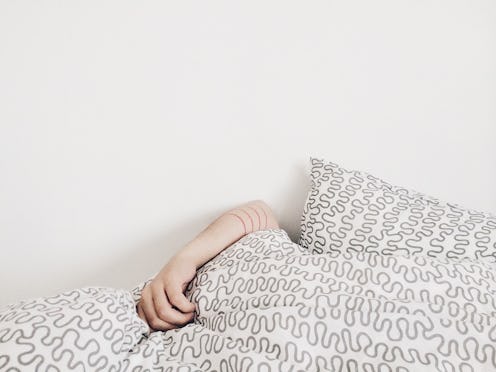Life
How Your Daytime Habits Are Affecting Your Sleep

Most of us already know not to drink caffeine too late or each too much dessert before bed. But in addition to the obvious culprits, there are a number of other surprising things that can affect how you sleep. Certain habits can not only keep you up at night, but can affect your sleep quality, number of hours you sleep, and how well-rested you feel the following day.
The National Institutes of Health suggests seven to eight hours of sleep per night, yet according to the Centers For Disease Control and Prevention, nearly 30 percent of adults report sleeping less than six hours per night. People who experience sleep deficiency are at a greater risk of health problems, including diabetes, cancer, depression, and hypertension.
Nothing is worse than hitting the sack, only to find yourself wide awake and pondering over tomorrow's tasks, so it's important to figure out what's causing your mind and body to stay awake at night. What you do during the day can affect how you feel at night, and you can start preparing yourself for a good night's rest long before you put on your pajamas.
If you find yourself tossing and turning at night, and you're not quite sure why, it may be one of these seven surprising things that can affect your quality of sleep.
1. Lack of Exercise
A study in The Journal Of Clinical Sleep Medicine found that exercising three to four times a week for just 30 minutes can help people sleep longer and more soundly throughout the night. "Exercise increases Brain Derived Neurotrophic Factor (BDNF), which is a neurotransmitter that decreases anxiety and increases relaxation," says Dr. Robert S. Rosenberg, Board- Certified Sleep Medicine Physician and author of Sleep Soundly Every Night, Feel Fantastic Every Day over email. "It also elevates body temperature increasing the strength of our circadian rhythms."
2. Staying Inside All Day
Exposure to light plays a role in our sleep cycles, so spending too much time in dim-lit areas can throw off your body's natural rhythm and keep you up at night. "The more light you expose yourself to during the day, the easier it will be to fall asleep at night," says Rosenberg. "Bright sunlight during the day strengthens our circadian rhythms and makes it more likely we will fall asleep at night."
3. Eating Spicy Foods
"Spicy foods when eaten close to bedtime can increase our body temperatures and cause heartburn," says Rosenberg. A study published in the The International Journal of Psychophysiology found that people who ate spicy meals before bed took longer to fall asleep and experienced less sleep over all.
4. Sleeping In A Warm Room
Although it might feel extra cozy to go to sleep in a heated room, it may cause a problem for your slumber. "When we go to sleep, our core body temperature drops," says Rosenberg. "That is a signal our brain interprets to induce sleep. If your environment is too warm, it inhibits this drop and makes it harder to fall and remain asleep." Rosenberg recommends keeping your bedroom between 65 and 70 degrees.
5. Poor Air Quality
The Harvard School of Public Health found that air pollution increases the risk of breathing problems during sleep, which can cause sleep disorders including sleep apnea. Make sure your home is well ventilated and install an air conditioning system if you suspect your environment may be polluted.
6. Your Cell Phone
Using your cell phone or other technology before bed can keep you up at night, and not just because you're preoccupied with incoming text messages. Cell phones emit light that can interfere with our sleep cycles, and using technology before bed increases the time it takes you to fall asleep as well as your quality and length of sleep.
7. Your Nightly Glass Of Wine
Although it may seem like a glass of wine before bed might help you doze off, alcohol affects your body's sleep homeostasis, the brain's built-in mechanism that regulates your body's sleep and wake cycles. This can cause disrupted sleep and an earlier rise time.
Everyone is affected differently, so it's important to pay attention to what habits work for you and which you should avoid for better rest.